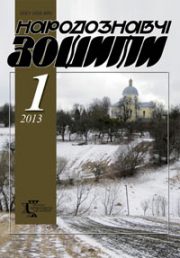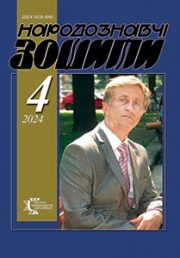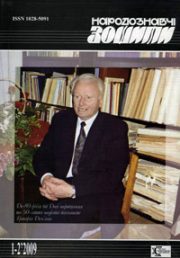The Ethnology Notebooks. 2022. № 2 (164), 287—293
UDK 929(477.83)”1960/2021″Є.Луньо:[39:378.4(477.83-25)ЛНУім.І.Франка]
DOI https://doi.org/10.15407/nz2022.02.287
YEVHEN LUNYO IS AN EARNEST FRIEND OF ETHNOLOGISTS OF IVAN FRANKO NATIONAL UNIVERSITY OF LVIV
HLUSHKO Mykhaylo
- ORCID ID: https://orcid.org/0000-0003-3520-8891
- Doktor of History, Professor,
- the Ivan Franko National University of Lviv,
- the Chair of Ethnology,
- 1, Universitets’ka str., 79000, Lviv, Ukraine,
- Contacts: e-mail:m.s.hlushko@gmail.com
Abstract. Using memoirs and written testimonies kept in the home archive of the reconnaissances author, we simulate history of personal cooperation and business relations of the Department of Ethnology of Ivan Franko National University of Lviv with Yevhen Lunyo, born in Yavoriv, Lviv region, a leading expert in Ukrainian insurgent folklore.
It is about his involvement in conducting ethnographic research by students and teachers of the higher education establishment in Yavoriv district, preparation of diploma and master’s theses based on the collected ethnographic materials, «Nadsiannia» monograph.
Rationale is predetermined by the need to compile a chronicle of the most important events in the field of ethnography in the independent Ukraine, study, use, and promotion of the creative work of the leading professionals.
Scientific studies object is the life and creative path of Yevhen Lunyo, Candidate of Philological Sciences.
The research subject is his cooperation with teachers and students of the Department of Ethnology of Ivan Franko National University of Lviv, involvement in organizing and conducting field ethnographic research in Yavoriv district.
Upon application of various research methods (interviews, field observations, comparative-historical analysis, etc.) the role of a person in history, in particular in development of ethnography of the independent Ukraine, was found to be important. Yevhen Lunyo’s participation in organization of field ethnographic expeditions-practices of members of the Department of Ethnology of Ivan Franko National University of Lviv contributed to the fact that a significant array of ethnographic, folklore and linguistic sources has been collected for the first time in the history of Ukrainian science, thus enabling singling out Nadsiannia as a separate ethnographic region of Ukraine.
Keywords: Yevhen Lunyo, Yavoriv district, Nadsyannia, cooperation, Department of Ethnology, Ivan Franko National University of Lviv, field ethnographic research.
Received 30.04.2022
REFERENCES
- Datsko, V. (2019). Yavoriv branch. Native land chronicle in biographies: encyclopedic biographical guide (P. 217). Lviv [in Ukrainian].
- Koval-Fuchilo, I., & Srypnyk, H. (Ed.). (2019). Lunyo Yevhen Andriyovych. The Ukrainian Folklore Encyclopedia (Pp. 489—490). Kyiv: IMFE im. M.T. Rylskoho NAN of Ukraine [in Ukrainian].
- Chikalo, O., & Sokil, V. (Ed.). (2018). Lunyo Yevhen Andriyovych. The Ukrainian Folklore Encyclopedia (Pp. 459—460).Lviv: The Institut of Ethnology NAN of Ukraine [in Ukrainian].
- Hlushko, M. (2017). Historiography of the ethnological research of Nadsiannia. The Ethnology Notebooks, 2, 368—379 [in Ukrainian].
- Hlushko, M., & Khomchak, L. (2017). Nadsiannia: traditional culture and life (ethnolinguistic treasures). Lviv [in Ukrainian].
- Chikalo, O. (2021). Professional, moral and ethical code of Yevhen Lunyo (1960—2021). The Ethnology Notebooks, 2, 500—502 [in Ukrainian].
- Kuzmenko, O., & Lunyo, Y. (Ed.). (2015, 2017). Autobiographical narrative as a valuable source of oral history and genres of narrative folklore of Yavoriv district in insurgent struggle. Stories of participants and eyewitnesses (Vol. 2). Lviv: Rastr-7; The Ethnology Notebooks, 3, 737—741 [in Ukrainian].
- (2000). Correspondence of Roman Kyrchiv with Hryhorii Demyan. The Ethnology Notebooks, 2, 414—447 [in Ukrainian].
- Lunyo, Ye. (2000). Roman Kyrchiv and His Role in Foundation of Department of Folklore Studies, the Ethnology Institute of UNAS. The Ethnology Notebooks, 3, 454—464 [in Ukrainian].
- Lunyo, Ye.A. (1993). Ritual and customary folklore of Yavoriv district: extended abstract of thesis of […] candidate of philological sciences. Kyiv [in Ukrainian].
- Danylyuk, A. (2003). In the ways of Ukraine. Lviv: Svit [in Ukrainian].
- Khomchak, L. (2012). Family ceremony vocabulary in Sian River dialect: extended abstract of thesis of […] candidate of philological sciences. Lviv [in Ukrainan].
- Riznyk, V. (2017). The names of foodstuffs and kitchen utensils in the Ukrainian dialects of the San-Dniester region: extended abstract of thesis of […] candidate of philological sciences. Lviv [in Ukrainian].






